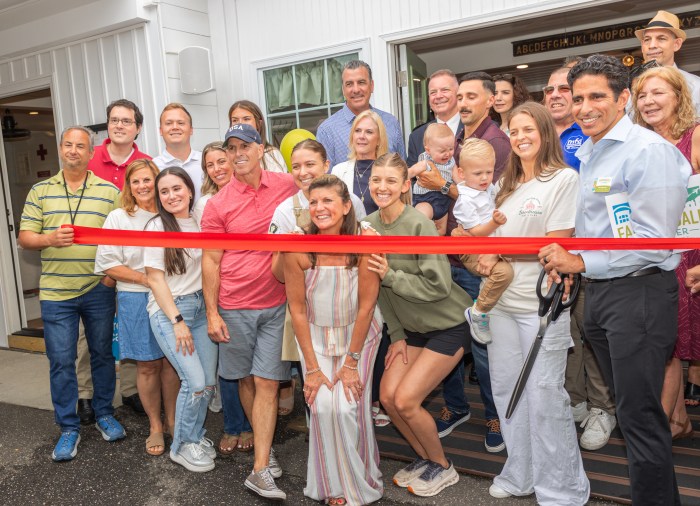Residents at Farmingdale Meeting Told Plans for Shelter Are Cancelled
One week after Farmingdale School District residents were told that Suffolk County Executive Steve Levy had his eye on three locations within their school district as a potential location for a homeless shelter to house sex offenders, officials announced the plan’s cancellation.
At a heated meeting at Farmingdale High School on Tuesday, Jan. 12, Deputy Suffolk County Executive Ben Zwirn announced Levy had abandoned plans to possibly house the homeless shelter in the district.
“This has been a torturous process for us in Suffolk County,” Zwirn told the crowded auditorium at Farmingdale High School. “What Levy tried to do was get these people off the streets at night and segregate them from residential communities.”
Part of the Farmingdale School District is in Suffolk County, while most of the district’s children who attend its schools reside in Nassau County.
One week earlier, Suffolk County Department of Social Services Commissioner Gregory Blass announced plans to look at three possible locations in the Farmingdale School District to house a shelter for level two and three registered sex offenders.
Residents and parents expressed their outrage at the possibility of putting sex offenders so close to schools and child-friendly businesses. They wrote letters, made phone calls, attended meetings and press conferences and voiced their opinions.
While the outrage is expected, as any community struggles with the “not in my backyard” mentality, it’s the lack of communication from Suffolk County government that had many residents up in arms.
“There was no discussion with the district,” Farmingdale’s Board of Education President Shari Bardash-Eivers told the Farmingdale Observer before the Tuesday meeting. “We were not involved at all. I’d like to discuss this a little further; I’m hoping they’ll change their minds.”
They did change their minds and now elected officials say the victory is great but there are still battles to fight.
“We immediately went to work together. It really was a bipartisan, bicounty effort.” Nassau County Legislator Joseph Belesi (R-14th District) told the standing-room-only crowd Tuesday night. “We must remain vigilant in our community because the children come first.”
As elected officials from both Suffolk and Nassau counties spoke, they all agreed that this is a victory that was won by the very vocal community. However, they agreed that there is still an issue that residents have to face.
“Let’s take this victory and continue to be vigilant,” Town of Oyster Bay Clerk Steve Labriola told the audience. “Let’s work on getting a better civil confinement bill. This particular issue has been a passion of mine for many years.” Labriola said he tried to get a civil confinement law passed when he was a state assemblyman.
Within the last year or so, Labriola said the state passed a civil confinement law but it has been “watered down” from what it should be and still needs strengthening.
“Civil confinement is a very long, difficult, costly process,” Labriola told the Observer. “…to put [level three registered sex offenders] in a secure mental facility. There are about 70 now since this law was passed but it’s like getting the death penalty in New York. When it finally passed, it’s filled with costly appeals and a process that takes forever.”
Labriola said the process of confining level three sex offenders to a psychiatric institution needs to be smoother and simpler.
According to Suffolk County officials, instead of housing homeless sex offenders in the proposed Farmingdale site and the two current locations, Westhampton Beach and Riverhead, Suffolk County will now follow Nassau County’s lead and offer housing vouchers to homeless sex offenders. This will eliminate “clusters” of sex offenders and will give these individuals freedom to choose where they stay overnight, provided the location complies with Megan’s Law, which disallows convicted sex offenders from coming within 1,000 feet of schools, among other stipulations.
With the homeless shelters for sex offenders, “We wanted to keep them away from other families that were homeless and segregate them,” Zwirn said. With the housing vouchers, Zwirn said “they won’t have the supervision that they had.”
With the voucher program comes a whole new set of problems, residents pointed out at the meeting on Tuesday. Reiterating Zwirn’s statement, residents commented that these sex offenders are now dispersed throughout the community at motels instead of concentrated at a shelter.
“They need to know that our community is watching them,” Labriola said of sex offenders in the community. “We know where they live and their comings and goings.”
Suffolk County Department of Social Services Deputy Commissioner Edward Hernandez spoke at the meeting and told residents that although they won the battle against the homeless shelter, there are still sex offenders living in their community.
The NYS Division of Criminal Justice Services website lists registered sex offenders by town and residents can go on the website to see where they may be living in their community.
Deputy Commissioner Hernandez told the Farmingdale Observer in an earlier interview that the state mandates the county provide emergency housing for homeless individuals without regard to issues like criminal history.
What was at issue in this case, Hernandez said, was the state also requires that the county house those individuals in facilities that have adequate showering amenities. The current trailers in Westhampton Beach and Riverhead reached their capacity, requiring additional housing. The trailers also don’t have showers and the county was hoping a new facility, possibly in Farmingdale, would give them that amenity.
“We have a problem that there is no good answer to,” Hernandez said. “We have to pick the best of a series of bad options.”
According to the NYS Division of Criminal Justice Services website, “The risk level is based on the court’s assessment regarding whether a particular offender is likely to repeat the same or similar registerable offense and the danger the offender poses to the community. Because the risk level reflects factors unique to a particular sex offender, offenders convicted of the same offense may receive different risk levels.”
A convicted sex offender who poses a moderate risk of repeating an offense, will be designated a level two offender. An offender who poses a high risk of repeating an offense and a threat to public safety exists, will be designated a level three offender, according to the New York State Division of Criminal Justice Services.
After serving their jail sentence, sex offenders are required to register with the state’s Division of Criminal Justice Services. Level two and level three sex offenders remain on the registry for life.
According to Suffolk County Legislator DuWayne Gregory (D-15th District), who represents East Farmingdale in the County Legislature, the three locations the county was looking at were on Gaza Boulevard, Marine Street, and Route 109. Hernandez would not confirm these locations in an interview, saying the county was looking at several sites.
“As we’re seeing more and more sex offenders, we’ve had to look elsewhere for additional facilities,” Hernandez told the Observer. It’s a simple matter of not having enough space at the Westhampton Beach and Riverhead sites, he said.
Now, with the voucher program in place, county officials won’t have to worry about where they can house these individuals but rather simply refund up to $90 for a night’s rest. Hernandez said a master list will be created that will have every eligible hotel and motel in the county on it. Eligible lodgings have to meet Megan’s Law requirements.
“The elected officials listened to the voices of the residents and they did the right thing,” Town of Oyster Bay Supervisor John Venditto told the crowd. “The residents stood tall and in a very loud voice made their feelings known.”
Still, having the voucher program in place didn’t seem to ease the fear of residents as they shouted to change the system.
“The overriding laws need to be adjusted,” Venditto said. They need to be adjusted on a state level as it’s the state that has handed down requirements to the Department of Social Services.
“Call your state assemblyman and state senator,” Venditto told the crowd. “Let them know you don’t ever want to go through this nightmare again. They’re not here; you want a good piece of advice? Get them here.”
In response to the crowd’s protests, Zwirn suggested setting up another meeting with state officials to answer questions. At the end of the meeting, Belesi vowed to contact more officials and schedule another meeting to get all residents’ questions answered.
“We won the battle but there is still a war going on,” Venditto said. “Have all of us back here but we need to bring to the floor the people at the state level who are responsible for the policy.”

































